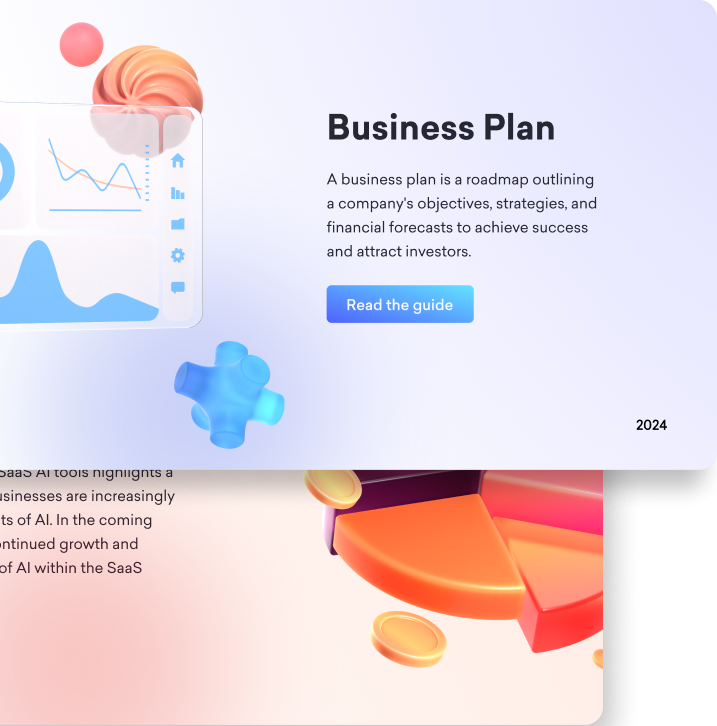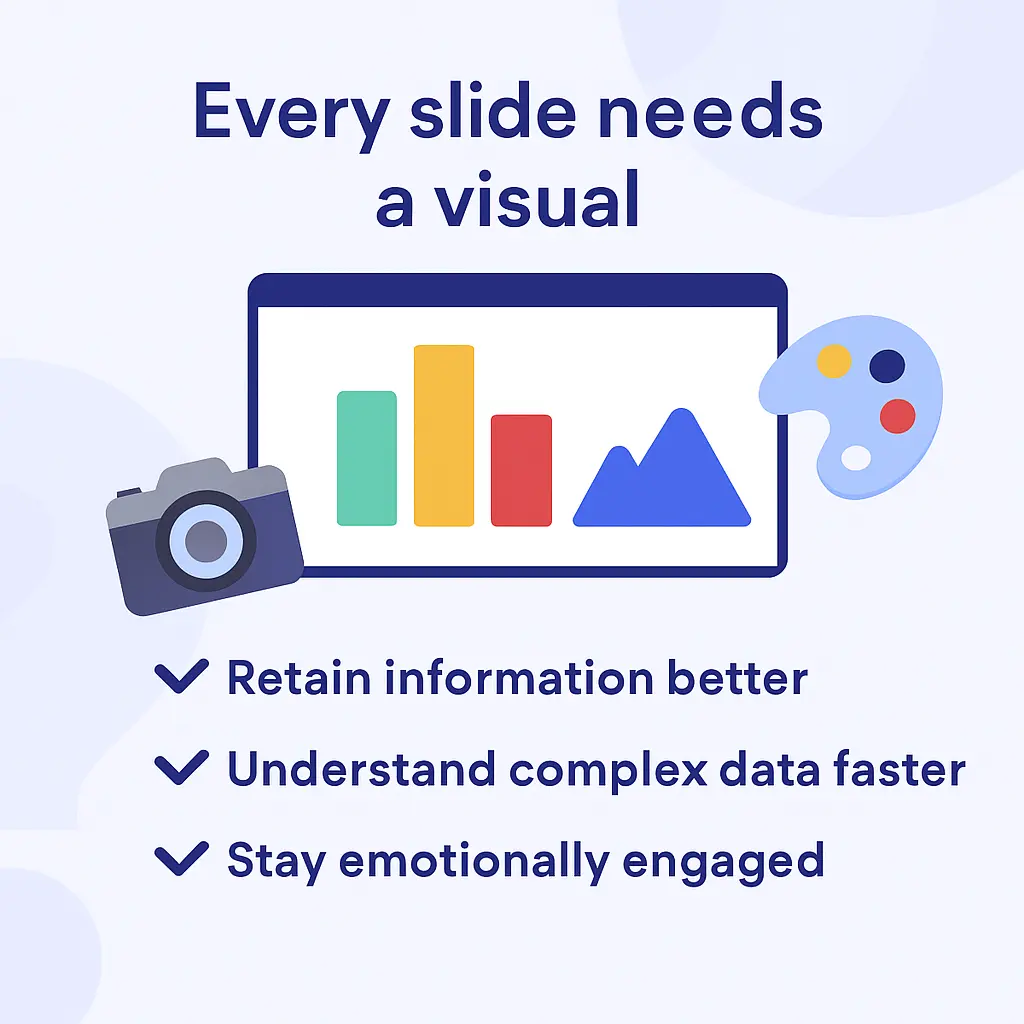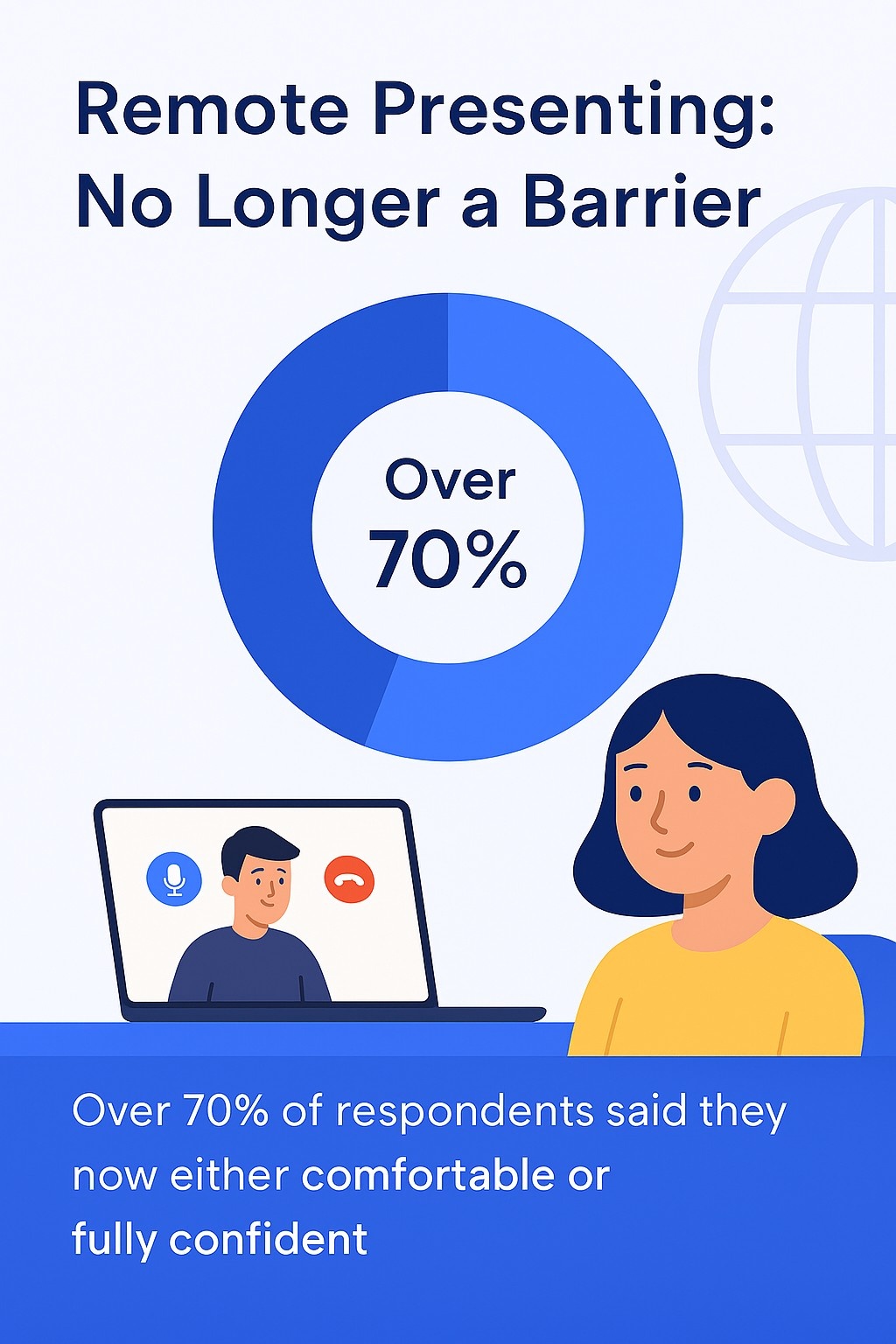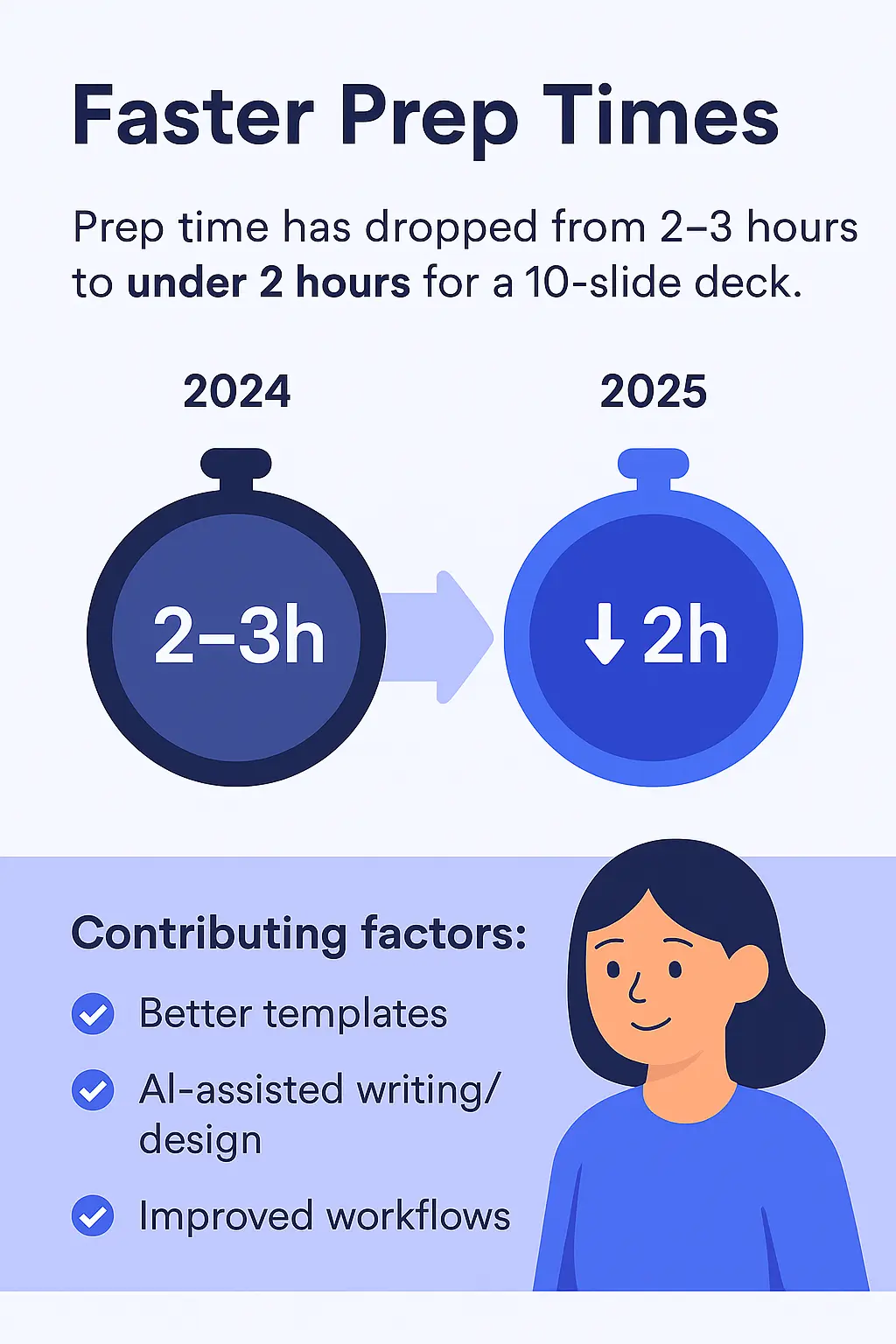
Presentations Are Evolving—Fast
In 2025, presentations are smarter, shorter, and more visual than ever. With attention spans shrinking and AI tools rising, the old rules no longer apply. Text-heavy slides and long lectures are out; clarity, design, and engagement are in. If you’re preparing a presentation this year, this blog is your 2025 playbook.

📊 Presentation Preferences in 2025: The Era of Lean and Visual Decks
1. ⏳ Presentation Length: 10–15 Minutes Is the Sweet Spot
The data confirms what many speakers have long suspected: attention spans are shorter than ever. Over 60% of respondents said the optimal presentation length is 10–15 minutes.
That’s just enough time to make a point, tell a story, and leave room for Q&A—without losing your audience to their notifications.
🔑 Pro Tip: Build presentations with 10 slides or fewer, and structure them like a mini story—intro, core message, key data, call to action.

2. 📉 Attention Span: Now 5–10 Minutes (and Dropping)
If you thought you had 15 minutes, think again. While 10–15 minutes is the preferred presentation duration, our survey shows that actual attention spans average just 5–10 minutes.
This means your first 3 slides must grab attention—through strong hooks, compelling visuals, and emotional relevance.
🔥 SEO keyword insight: Target terms like “how to hold audience attention,” “presentation engagement tips,” and “attention span in 2025.”

3. 📝 Slide Text: Keep It Under 25%
It’s official: text-heavy slides are out.
A majority of survey participants said slides should contain no more than 10–25% text. Slides are now treated like visual aids, not reading material.
💡 Why it matters: Slides overloaded with text increase cognitive fatigue, leading to disengagement and multitasking.
Social media-ready stat: "Over 70% of audiences prefer slides with less than 25% text. Clean design = better retention."

🖼️ Visuals Are Now Non-Negotiable
4. 🎨 Every Slide Needs a Visual
When we asked participants whether slides should include visuals, the answer was nearly unanimous: yes, always.
From charts to photos to illustrations, visuals help audiences:
- Retain information better
- Understand complex data faster
- Stay emotionally engaged
📷 Design tip: Use tools like Decktopus to auto-generate visual-rich slides with GIFs, icons, and branded images.

📱 The Distraction Dilemma
5. 📵 1 in 3 People Admit to Multitasking During Presentations
In a world of notifications and second screens, distraction is the new default.
Compared to 2024, distraction levels have jumped significantly—from 20% to over 33%. And most attendees say presentation quality and interactivity determine whether they stay focused.
✅ Combat distraction with:
- Live polls and Q&A
- Story-driven slides
- Dynamic pacing and transitions

🎤 What Makes a Presentation Unforgettable?
6. 📖 Storytelling Is Still King
When asked what makes a presentation memorable, the overwhelming top answer was: the story.
Whether you’re pitching an idea, teaching a class, or delivering quarterly updates, stories activate emotional memory—making your message stick.
🧠 Also ranked: Storytelling(1st), statistics (2nd) and visuals (3rd).

7. 🧑🤝🧑 Presenters Who Connect, Win
The top two expectations from presenters?
- Clear speech
- Audience interaction
In other words, clarity and connection beat charisma and polish. It's not about performance—it's about presence.
🎤 Try these:
- Ask rhetorical questions
- Refer to your audience's context
- Use conversational language

🧱 How People Build Decks in 2025
8. 🗓️ Presentation Frequency: Weekly Is the New Normal
Over 50% of respondents said they now create presentations at least once a week—especially in remote-first and hybrid teams.
Compare that to 2021’s average of once per month, and you’ll see just how embedded presentations are in our day-to-day workflows.

9. 🧑💼 What Are Presentations Used For?
A major shift has occurred in why people present.
- Internal updates and project reviews are now the most common use cases.
- Investor decks and conference sessions also gained traction.
- Academic presentations have declined as remote corporate comms take center stage.
💼 Insight: The modern presenter is no longer just a student or keynote speaker—they’re a manager, marketer, or founder.

💻 Remote Presenting & AI: From Niche to Normal
10. 🌐 Remote Presenting: No Longer a Barrier
Over 70% of respondents said they are either comfortable or fully confident presenting remotely.
Platforms like Zoom and Google Meet are now default environments, not backups.
🎯 Tip: Use presentation software that integrates with remote tools (Decktopus does!), so your slides look sharp even over video.

11. 🤖 AI in Presentations: From Curiosity to Co-Pilot
Perhaps the biggest shift this year? AI usage has gone mainstream.
- Over 72% use AI in content generation, design, and slide layout
- Most say AI saves time and improves overall quality
- Growing demand for features like:
- Audience feedback tools
- AI avatars
- AR/VR integrations
🛠️ Future-focused presenters are already testing these innovations.

🔁 Efficiency & Confidence Are Up
12. 🔂 Deck Reuse is Common (and Smart)
Respondents say they reuse slide decks 3–5 times or more, especially in team updates and client pitches.
♻️ Pro tip: Create a reusable template library. It’ll save you hours every month.

13. ⏱️ Faster Prep Times
Compared to 2024, prep time has dropped from 2–3 hours to under 2 hours for a 10-slide deck.
Contributing factors:
- Better templates
- AI-assisted writing/design
- Improved workflows

⚠️ Challenges & Expectations for Tools
14. ❌ Biggest Problems with Tools?
- Bad design results
- Time-consuming interfaces
- Limited templates
- Steep learning curves
Tools must prioritize intuitiveness and automation, not just features.

15. 🎯 What Should Tools Focus On?
The #1 request from respondents?
“Give us better templates and smarter design guidance.”
People want tools that help them start fast, stay on brand, and avoid design traps.

🧑🏫 Presentations in Education: Still Critical
16. 🏫 Should Presenting Be Mandatory in School?
The majority say yes—presenting builds confidence, communication, and persuasion skills.
Educators, take note: presentation tools that cater to students and teachers will be essential in the coming years.

📈 2024 vs. 2025: Key Changes You Need to Know

✅ 2025 Presentation Best Practices: Your Action Checklist
1. Keep it short & sharp
→ Aim for 10–15 minutes, 10 slides or fewer
2. Reduce text
→ Use 10–25% text max per slide
3. Tell a story
→ Start with a problem, add context, end with a solution
4. Use visuals wisely
→ Avoid clutter; one strong visual per slide
5. Engage early and often
→ Ask questions, launch a poll, invite responses
6. Prep smarter, not longer
→ Reuse templates, automate design
7. Use AI strategically
→ For content, tone, layout, and audience insights
🧠 Final Thought: The 2025 Presenter Is a Hybrid Pro
The modern presenter is no longer just a speaker—they’re a content creator, facilitator, designer, and now, a technologist. To stand out in 2025, you must master tools, sharpen your story, and connect authentically—all in 10 minutes or less.
🛠️ About Decktopus
Decktopus is the all-in-one, AI-powered presentation platform built for modern teams. With smart templates, auto-design, and intuitive slide logic, Decktopus helps you create stunning, professional decks—in minutes, not hours.
✨ Try it today → decktopus.com
📥 Request a Demo | 📊 Built for Business & Education

.svg)
.svg)
.svg)










.svg)



.jpg)









.svg)
.svg)
.svg)
.svg)
.svg)
.svg)
.svg)
